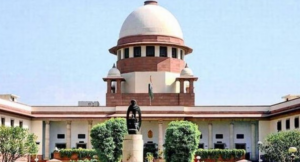Vodafone Idea Ltd., Bharti Airtel Ltd., and Tata Teleservices Ltd. could still receive a crucial relief despite the Supreme Court dismissing their petitions seeking a waiver on AGR dues.
Analysts are of the view that the government may suggest remedy—either defer or waive the payment of adjusted gross revenue dues towards interest, penalties, and interest on penalties—to preserve sector competition.
“The government has unequivocally stated that it doesn’t want less than three private telcos, but it has also said that it wants to cap its shareholding in Vi to 49% (current level),” said Vivekanand Subbaraman, lead analyst for telecom, media, oil and gas at Ambit Capital. “So, we think the government will either postpone or rationalise the AGR payments.”
A four-year moratorium on AGR payments expires in September, after which, payments resume on March 31, 2026.
Vodafone Idea, the most financially vulnerable telecom firm, will be required to pay Rs 18,000 crore annually for six years—more than double its current annual operational cash generation of Rs 8,400–9,200 crore.
Banks have refused to issue any fresh loans to the operator, while the government has also said that it will not offer any more financial aid after recently converting debt worth Rs 36,950 crore to equity. Currently, there is no more scope for conversion of more debt into equity, Subbaraman added.
Vi owes Rs 83,400 crore in AGR dues, as per the calculations of DoT. However, it had filed a writ petition under ‘sick industries’ category, requesting waiver on Rs 45,457 crore comprising interest, penalty, and interest on penalty. In addition to the AGR dues, Vi owes about Rs 1.19 lakh crore in spectrum dues, taking total government dues to over Rs 2 lakh crore as of March end.
The ailing telecom company had told the top court that it will not be able to continue operations beyond fiscal 2026 without financial support.
“Deferral of dues would just kick the can down the road,” said Subbaraman. “If the government opts for such a step, then Vi may not be able to raise bank loan viz. required for growth capex. Secondly, waiver of interest, penalty and interest on penalty components of the AGR dues would help Vi in raising bank debt, giving it an opportunity to survive.”
Tata Group’s loss-making telecom arm, Tata Teleservices Ltd., also must pay AGR dues worth Rs 19,256 crore, along with other dues to the central government by March 2026. With a negative net worth of Rs 17,876 crore and steep accumulated losses, TTSL is in no position to meet its obligations without support. But the Tatas may continue to support to address in shortfall in liquidity.
Bharti Airtel and its unit, Bharti Hexacom, too, sought relief on Rs 34,745 crore, out of their total AGR liability of Rs 43,980 crore. The group, in its petition, has argued that the Sept. 1, 2020, judgement on AGR has “caused a crippling financial impact” across the telecom industry.
According to analysts, Airtel’s dues would come to around Rs 8,400 crore annually in AGR instalments over six years.
While Vi’s situation is precarious, Bharti Airtel is better positioned to handle its AGR dues owing to its stronger financial health, cash reserves, and ability to raise funds.
This raises concerns of a potential exit of Vi that would undoubtedly leave India’s telecom market reduced to a duopoly — dominated by Reliance Jio and Bharti Airtel.
“Such concentration raises fundamental concerns over consumer choice, pricing discipline, and the robustness of competitive dynamics in one of the country’s most critical infrastructure sectors,” said Roma Priya, founder, Burgeon Law.
While the Supreme Court has made it clear that judicial intervention is off the table, the government—the largest shareholder in Vodafone Idea, holding a 48.99% stake—still retains the power to offer Vi a lifeline. “However, any intervention now would require weighing the risks to market competition, consumer welfare, and the value of its own investment, against the political precedent such a bailout might set.”
Priya added that bankruptcy remains a last resort, with serious consequences for jobs, consumer services, and market competition.
“If the government wants to help you, we are not coming in the way,” Justice J B Pardiwala said, while dismissing the operators’ AGR relief plea.
“This makes us wonder if this is actually the outcome that the companies and the government were perhaps hoping for and whether this now paves the way for the government to provide AGR relief, while staying compliant with court orders,” analysts at Citi Research said in a May 20 note.
Brokerage IIFL Capital echoed similar sentiments. “Despite the adverse SC order, we believe the fat lady has not yet sung for Vi,” it said.
“If the SC has observed that it would not oppose the government’s relief measures, the DoT can file a modification plea in the SC to get a formal order in this regard. This could enable the government to waive off 50% of interest, as well as 100% of penalty and interest on penalties pertaining to AGR dues, that it was reportedly considering earlier,” IIFL noted. “It could also extend the timeline for AGR payments, which would translate into cash flow relief. Further, it could consider rectifying calculation errors.”
If the government waives interest and penalties, IIFL estimates Bharti Airtel and Vi could save Rs 7,500 crore and Rs 9,700 crore annually. Extending the AGR deadline to FY51 could cut their yearly payouts by Rs 4,800 crore and Rs 9,400 crore from FY26 to FY31. Currently, their total dues are Rs 13,000 crore (Bharti) and Rs 21,500 crore (Vi).
A rectification of calculation errors could meaningfully reduce the AGR burden of Rs 38,600 crore and Rs 76,000 crore for Bharti and Vi, respectively, noted IIFL analysts. NDTV Profit

Leave a Reply